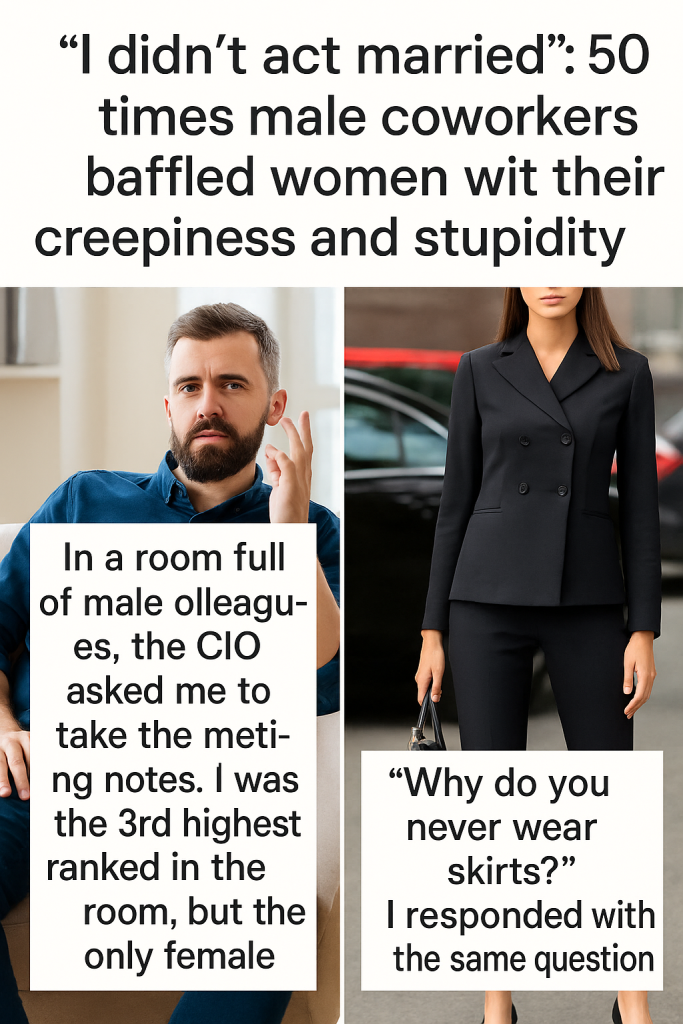In workplaces dominated by men, many women find themselves navigating an uncomfortable landscape peppered with awkward encounters and inappropriate behavior. A recent social media thread titled “I didn’t act married”: 50 times male coworkers baffled women with their creepiness and stupidity has gone viral in 2024, shedding light on the unsettling experiences women face daily in professional environments.
The conversation sparked when a female Chief Information Officer (CIO) posed a candid question during an internal meeting: “What’s the most baffling or inappropriate thing a male coworker has ever said or done to you at work?” The ensuing flood of responses uncovered a troubling pattern of clueless and sometimes downright creepy behavior from male colleagues in various industries.
Stories That Made Women Cringe
From unsolicited personal questions to outright inappropriate comments, women recounted incidents that blurred professional boundaries. One thread contributor shared how a male coworker expressed disbelief that she could manage her workload while raising children, insinuating she was “too emotional” to handle stress. Another recounted a man repeatedly attempting to guess if she was married despite clear answers, culminating in the infamous line: “You didn’t act married.”
Many women reported feeling infantilized or undermined. Yet others described more overtly unsettling moments, such as colleagues making suggestive remarks after-hours or invading personal space during meetings. The commonality among these incidents is a blatant disregard for professional respect and consent.
The Intersection of Ignorance and Entitlement
The thread highlights how some male coworkers operate from a place of ignorance rather than malice — their actions stemming from social cluelessness mixed with an outdated sense of entitlement. Statements like “I was just joking” or “I didn’t know it was inappropriate” were frequently noted as typical defenses offered by those called out.
However, this mindset perpetuates a toxic workplace culture where women must remain vigilant and often resort to ignoring or downplaying harassment to avoid career repercussions. One respondent commented, “I started keeping track of incidents because it felt like no one else would believe me if I reported them.”
Why This Matters in 2024
Despite growing awareness of workplace harassment and diversity initiatives, the stories reveal that many organizations still fail to cultivate genuinely respectful environments. The persistence of such behaviors suggests that policy changes alone are not enough; cultural shifts are imperative.
Experts argue that senior leaders must foster open dialogues that empower women to share their experiences without fear. The CIO’s question itself was a progressive step, demonstrating the role leadership can play in acknowledging and addressing uncomfortable truths.
Calls for Change
The viral thread has sparked widespread discussion about how workplaces can better support women. Suggested measures include mandatory training focused on unconscious bias and respect, clearer reporting mechanisms, and male allyship that challenges inappropriate conduct upfront.
Women participating in the discussion have also endorsed peer support networks and mentorship opportunities to build confidence and solidarity. As one user put it, “It’s not just about stopping the creeps — it’s about changing the culture so they don’t feel comfortable in the first place.”
In Conclusion
The “I didn’t act married” stories are more than anecdotes; they are an urgent reminder of the work still needed to ensure workplaces are safe, inclusive, and respectful for all genders. As 2024 continues, conversations like these will hopefully drive meaningful change rather than simply expose the problem.
For many women



